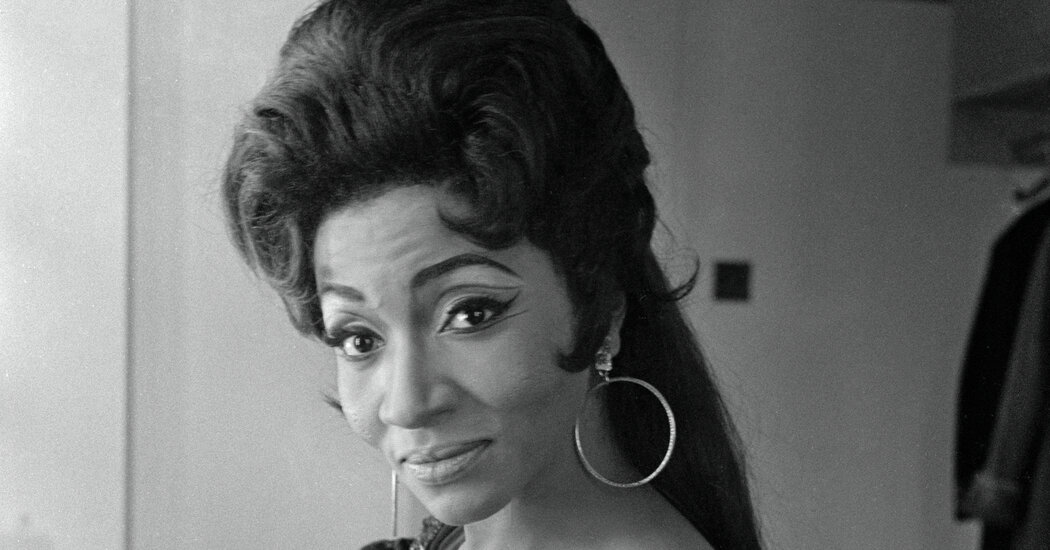
Grace Bumbry, a barrier-shattering mezzo-soprano whose vast vocal range and transcendent stage presence made her a towering figure in opera, and one its first, and biggest, Black stars, died on Sunday in Vienna. She was 86.
Her death, following a stroke in October, was confirmed in a statement by the Metropolitan Opera in New York, where she was long a mainstay, performing more than 200 times over two decades.
Growing up in St. Louis in an era of segregation, Ms. Bumbry came of age at a time when African American singers were a rare sight on the opera stage, despite breakthroughs by luminaries like Leontyne Price and Marian Anderson.
But with a fierce drive and an outsize charisma, Ms. Bumbry broke out internationally in 1960, at 23, when she sang Amneris in Verdi’s “Aida” at the Paris Opera.
The following year, she landed in something of a national scandal in West Germany when Wieland Wagner, a grandson of Richard Wagner, cast her as Venus, the Roman goddess of love, in a modernized version of Wagner’s “Tannhäuser” at the storied Bayreuth Festival.
She was the first Black woman to perform at the festival, cast as a character typically portrayed as a Nordic ideal in an opera written by a composer known for his antisemitism and German nationalism. The festival — and newspapers — were flooded with letters asserting that the composer would “turn in his grave.”
Ms. Bumbry was undeterred. Indeed, she was well prepared.
“Everything that I had learned from my childhood was now being tested,” she recalled in an interview with St. Louis Magazine in 2021. “Because I remember being discriminated against in the United States, so why should it be any different in Germany?”
The audience did not share such misgivings: Ms. Bumbry was showered with 30 minutes of applause. German critics were equally enchanted, christening her “the Black Venus.” The Cologne-area newspaper Kölnische Rundschau credited her with an “artistic triumph,” and Die Welt called her a “big discovery.”
Her landmark performance helped earn her a $250,000 contract (the equivalent of more than $2.5 million now) with the opera impresario Sol Hurok.
It also won her another honor: a performance at the White House, in February 1962. On the advice of European friends who had seen Ms. Bumbry at Bayreuth, Jacqueline Kennedy, the first lady, invited her to sing at a state dinner attended by President John F. Kennedy and Mrs. Kennedy, Vice President Lyndon B. Johnson, Chief Justice Earl Warren and other Washington power brokers.
Suddenly, she was a star.
“If there is a more exciting new voice than Grace Bumbry’s skyrocketing over the horizon I have not heard it,” Claudia Cassidy wrote in The Chicago Tribune in a review of a recording of her arias the same year. “This is a glorious voice, by grace of the gods given its chance to be heard in its fullest beauty.”
Of her Carnegie Hall debut in November 1962, Alan Rich of The New York Times gave a qualified review, but allowed that “Miss Bumbry has a gorgeous, clear, ringing voice and a great deal of control over it.”
“She can swoop without the slightest effort from a brilliant high to a beautiful resonant chest tone,” he wrote.
Ms. Bumbry transcended not only racial perceptions but vocal categorizations as well. Originally a mezzo-soprano, she made a striking departure by taking on soprano parts, too, which gave her access to marquee roles in operas such as Richard Strauss’s “Salome” and Puccini’s “Tosca.”
“She gloried in the fact that she was able to perform both roles in Verdi’s ‘Aïda,’” Fred Plotkin wrote in a 2013 appreciation for the website for WXQR, the New York public radio station. “She could be Tosca and Salome, but also Carmen and Eboli.”
Ms. Bumbry displayed a broad range in her choice of roles. In 1985, she received raves for her performance as Bess in the Metropolitan Opera’s 50th anniversary performance of George Gershwin’s “Porgy and Bess,” despite her conflicted feelings about a folk opera set among the tenements of Charleston, S.C., and rife with unflattering Black stereotypes.
“I thought it beneath me,” she said in an interview with Life magazine. “I felt I had worked far too hard, that we had come far too far to have to retrogress to 1935. My way of dealing with it was to see that it was really a piece of Americana, of American history, whether we liked it or not. Whether I sing it or not, it was still going to be there.”
Grace Melzia Bumbry was born on Jan. 4, 1937, in St. Louis, the youngest of three children of Benjamin Bumbry, a railroad freight handler, and Melzia Bumbry, a schoolteacher.
A musical prodigy as a youth, she honed her skills in the choir at St. Louis Union Memorial Church and by performing Chopin on the piano at ladies’ tea parties. At 16, she saw a performance by Ms. Anderson, who would become a mentor, and was inspired to enter a singing contest on a local radio station. She took top prize, which included a $1,000 war bond and a scholarship to the St. Louis Institute of Music. She was nonetheless denied admission because of her race.
“The reality was wounding,” Ms. Bumbry said in an interview with The Boston Globe. “But when it happened, I also thought, I’m the winner. Nothing can change that. My talent is superior.”
Embarrassed, the radio contest organizers arranged for her to appear on “Talent Scouts,” a national radio and television program hosted by Arthur Godfrey. After hearing her heart-rending performance of “O Don Fatale,” from Verdi’s “Don Carlo,” the avuncular Mr. Godfrey informed the audience, “Her name will be one of the most famous names in music one day.”
The exposure helped put her on a path to Boston University, and later, Northwestern University, where she fell under the tutelage of the German opera luminary Lotte Lehmann, who became another valuable mentor as Ms. Bumbry moved toward her debut in Paris.
As her star continued to rise over the years, Ms. Bumbry was never afraid to inhabit the prima donna role offstage as well as on, outfitting herself in Yves Saint Laurent and Oscar de la Renta and tooling around in a Lamborghini.
After marrying the tenor Erwin Jaeckel in 1963, she settled in a villa in Lugano, Switzerland. The couple divorced in 1972. Ms. Bumbry left no immediate survivors.
Beyond her prodigious vocal skills, Ms. Bumbry brought a famous sultriness to her roles, a reputation she put to good use for a 1970 performance of “Salome” at the Royal Opera House in London.
She leaked word to the press that for the racy “Dance of the Seven Veils,” she would strip off all seven veils, down to her “jewels and perfume,” as she put it — although the jewels, it turned out, were sufficient enough to serve as a “modest bikini,” as The New York Times noted.
It hardly mattered. “In the history of Covent Garden,” Ms. Bumbry said in a 1985 interview with People magazine, “they never sold so many binoculars.”













